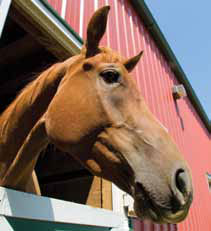Audit outlines Horse Protection Program deficiencies
Current practices by the Department of Agriculture to ensure the humane treatment of horses exhibited at shows or being transported to slaughterhouses will soon undergo some major revamping. The changes come after an audit this past fall by the USDA Office of Inspector General, which analyzed the USDA Animal and Plant Health Inspection Service's oversight of the Horse Protection Program and the Slaughter Horse Transport Program.
 According to the audit's executive summary, the OIG found that APHIS' program for inspecting horses for soring is not adequate to ensure that these animals are not being abused. In addition, the audit said APHIS needs to improve its methods for ensuring that horses being shipped for slaughter are treated humanely.
According to the audit's executive summary, the OIG found that APHIS' program for inspecting horses for soring is not adequate to ensure that these animals are not being abused. In addition, the audit said APHIS needs to improve its methods for ensuring that horses being shipped for slaughter are treated humanely.
Currently, horse industry organizations hire, train, and license their own inspectors—known as designated qualified persons—to inspect horses at the shows they sponsor for signs of soring and issue violations to exhibitors who abuse their horses.
However, the OIG found that these individuals do not always inspect horses sufficiently to effectively enforce the law and accompanying regulations. In addition, in some instances when they do find violations, they deliberately issue tickets to friends or family members of the responsible individual so the responsible person could avoid receiving repeat penalties for violating the Horse Protection Act.
Given APHIS' limited resources, the DQP system was developed as a way for the agency to appoint inspectors and determine the manner of inspections. In fiscal year 2007, the Horse Protection Program's budget of $497,000 was only enough to send APHIS veterinarians to 30 of the 463 sanctioned shows throughout the country.
Overall, the audit found that DQPs working independently issued few tickets and were much more likely to issue violations when they were being observed by an APHIS employee. From 2005-2008, APHIS veterinarians were present at only 6 percent of all shows, yet 49 percent of all violations issued by DQPs during this period were issued at these shows.
Additionally, the audit found that the environment for enforcing the Horse Protection Act is hostile. "Show organizers, exhibitors, and spectators denied the inspectors the physical environment they needed to inspect horses, verbally abused them, and even made anti-USDA comments over the public address system," according to APHIS records.
As for the Slaughter Horse Transport Program, the OIG found that APHIS does not deny individuals with a record of inhumanely transporting slaughter horses the authorization to ship other loads of horses, even if unpaid fines are pending for previous violations. Regulations currently do not address denying this authority. Plus, the audit found deficiencies in how APHIS controls tags for horses that have been inspected and approved for shipment to foreign slaughterhouses, in addition to an ineffective control or tracking system to trace all backtags used for horses transported to slaughter.
The OIG's recommendations included abolishing the system currently in place to preventing soring and establishing an inspection process involving independent, accredited veterinarians. The OIG also said it would like to see revisions to the slaughter horse transport regulations and development of a database of individuals who have violated the regulations of the Slaughter Horse Transport Program and have not paid the associated fines.
David Sacks, an APHIS spokesperson, said the agency welcomed the OIG's findings from the audit and that the agency will take several actions in reaction to the audit. These include but are not limited to the following:
- Revising the regulations to require DQPs to be licensed with APHIS and independent from the horse show industry.
- Requesting from Congress nearly double the amount of funding to enforce the Horse Protection Act.
- Pursuing the authority for APHIS to directly discipline DQPs.
- Ensuring that horse show management actively identify individuals currently on suspension because of previous Horse Protection Act violations and prohibit their participation in show events.
- Evaluating the establishment of an agency-wide policy that would deny certain services typically provided by the agency, such as endorsing shipping documents, to persons who have outstanding civil penalties for APHIS violations—including violations under the Slaughter Horse Transport Program.
- Evaluating options for better regulation of backtag application and tracking.
- Publishing a final rule based on the proposal to expand the scope of the Slaughter Horse Transport Program.
"Basically, the bottom line is we're always working to put an end to soring. That's the whole reason for the Horse Protection Act and the reason for the USDA to enforce it. As long as soring is out there, we will do the best we can do to eliminate it."